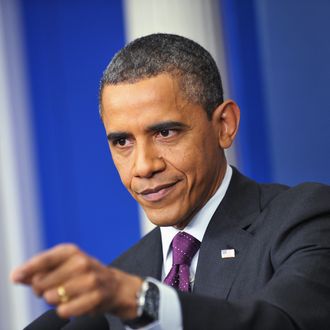
A front-page story in the New York Times today describes the process by which reporters at major news organizations — including Bloomberg, the Washington Post, and yes, the Times — agree to let political campaigns not only have veto power over which quotes get used, but allow after-the-fact editing on remarks from insiders. “The quotations come back redacted, stripped of colorful metaphors, colloquial language and anything even mildly provocative,” the Times reports.
Afraid of losing their access to top spokesmen and strategists, journalists agree to the tweaks. Both the Obama and Romney campaigns have their own quote-approval demands, and the results are official lines that always stay on-script, lack any off-the-cuff qualities, and on top of that, are often anonymous anyway. And in playing by the rules written for them by those they’re supposed to be covering, print journalists falls further behind the times.
The article includes zero examples of printed quotes that wound up causing a problem for either campaign, which may go to show just how pervasive the practice is. Instead, the Times notes, stand-out statements come when editing isn’t an option:
Damaging sound bites can live on in the news cycle for days. Mr. Obama’s remark last month during a televised news conference that “the private sector is doing fine” landed almost immediately in attack ads. And Eric Fehrnstrom’s “Etch A Sketch” comment on CNN, about softening some of the harder positions Mr. Romney took during the primaries, continues to haunt the Romney campaign five months later.
Live television, in other words, is the real gladiator arena in today’s YouTube-able, gaffe-centric political culture, leaving other more staid mediums to fall by the wayside.
Reporters, then, should just try saying no. “We don’t like the practice,” said Times managing editor Dean Baquet. “We encourage our reporters to push back. Unfortunately this practice is becoming increasingly common, and maybe we have to push back harder.” After all, major campaign scoops from newspapers and magazines often come without any input from the campaigns themselves, and rely on research, analysis, and document-digging instead of insider knowledge.
The Romney campaign often declines to comment altogether, but stories like the Boston Globe on Romney’s Bain tenure don’t require the quid pro quo. And giving the campaign final say over innocuous quotes isn’t going to keep you in their good graces in the face of legitimately revealing reporting regardless. Embracing the adversarial nature of the reporter-subject relationship makes everyone’s job harder, but it’s the reader who wins. And isn’t that the idea?





























